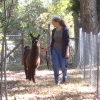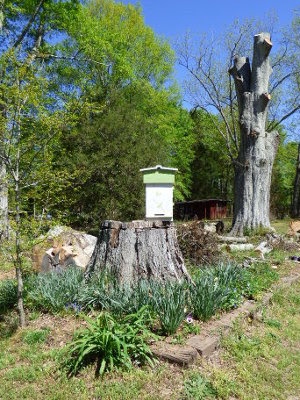

| Online: | |
| Visits: | |
| Stories: |

| Story Views | |
| Now: | |
| Last Hour: | |
| Last 24 Hours: | |
| Total: | |
Bait Hive
I've been mulling over the idea of a swarm bait hive for awhile now. I hadn't seen many honeybees around our place until we got ours, but I know they're out there. With Honeysuckle Hive now vacant, I seem to have no excuse not to try. After all, if I do nothing I can expect nothing. It's my old “something is better than nothing,” and who knows? I may be successful.
 |
| Honeysuckle Bait Hive |
It's not the perfect set-up, but it does meet quite a few honeybee qualifications. Studies have been done on this subject, plus almost every beekeeper who sets out bait hives has valuable experience from which to learn. Bees do have preferences about potential homes. Scout bees will go out, preview the options, and choose the one best suited for the swarm.
There are no hard and fast rules about this, but in general they are said to prefer:
- Height of 8 to 12 feet. (Some say as low as 6 feet or as high as 15 feet). Set on the stump mine is only 5 feet off the ground, but I don't see how I can get it any higher at present. I can't see me carrying it up a ladder or hoisting up a tree; and then bringing it back down again after dark! Then I read Pioneer Preppy's “Swarm Traps” post and learned that he's been able to catch swarms without the height, so that was the green light for me to give this a go.
- Visibility. If the scout bees can't see it, they won't know to consider it. Some say this is the reason for the height placement, since bees don't fly along the ground but rather up in the air. I would say mine is highly visible as it rather stands out in the yard.
- Volume of approximately 40 liters, which is roughly 9 point something US dry gallons. One Warré box is roughly the size of one of those square cardboard boxes that are used to ship four gallon jugs of milk, although a little shorter. For a Warré bait hive, two boxes are recommended as being close enough. Also recommended is placing top bars in the top box only. Top bars in both boxes will give the impression of smaller volume, and apparently, scout bees actually do measure the space.
- South or east facing. Got that.
- Near a water source. This is near our outdoor faucet which is used several times a day for watering critters. I've seen bees collecting water dripped on plants and in the mouth of the faucet.
- Some shade. Besides height, this is my other concern. Sun hits the hive at about —- in the morning and shade returns about 5 p.m. That means the hive is in full sun during the heat of the day, which I hope is not a deterrent.
- Correct scent. For this, lemongrass essential oil is recommended because it is similar to the pheromones the queen emits. I use this in my homemade honey-b-healthy, so I was good to go there.
- Previous occupation by honeybees. This probably contributes to correct scent. I read that apparently they like to find the dark, used comb, also propolis. This is where my old comb from Honeysuckle came in. Because there was evidence of wax moths in that comb, I stuck in in my deep freezer for 24 hours. This is said to kill any eggs, or larvae, or whatever.
- 300 meters from parent hive. My apiary is only on the other side of the house, but I'm not expecting my new colonies to swarm this year. So I think I'm okay on this requirement as well.
Of course there are exceptions to each of these “rules,” so maybe my points of noncompliance won't matter to a swarm of honeybees in need of a new home. According to our cooperative extension service, swarm season in my neck of the woods is May and June. I'm ready.
Lastly, a few links of interest:
- Catching a Swarm with a Bait Hive at Natural-Beekeeping
- I LOVE SWARMS: The Complete Guide to Attracting Honeybees at Horizontal Hives
- Bait Hives at David Heaf's Warré website.
Source: http://www.5acresandadream.com/2016/04/bait-hive.html


